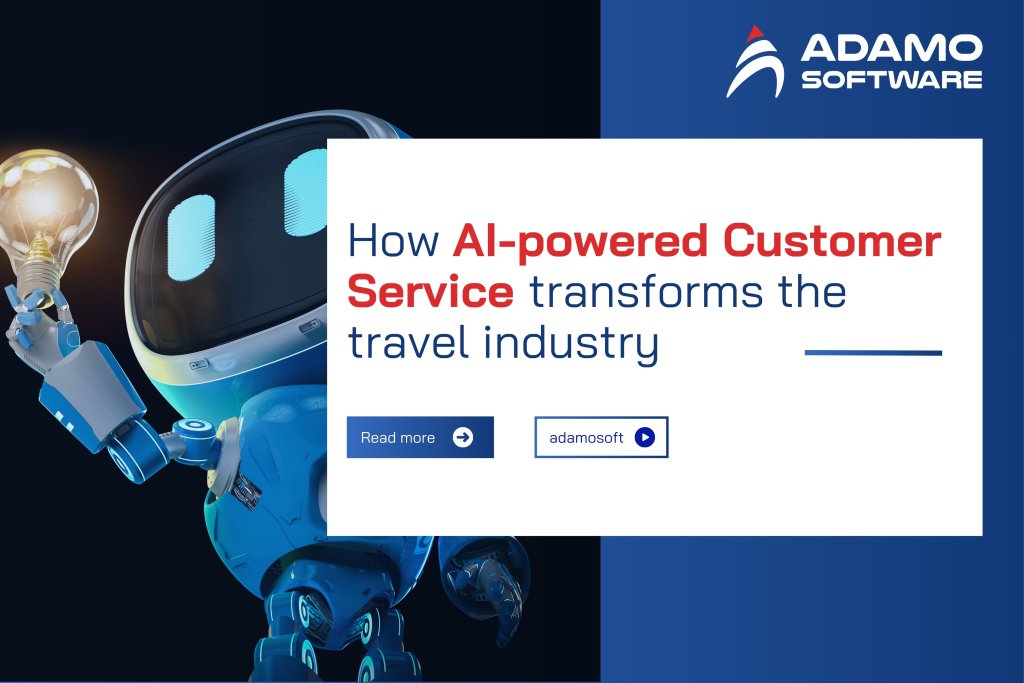How AI in Travel Industry Is Changing Travelers Experience
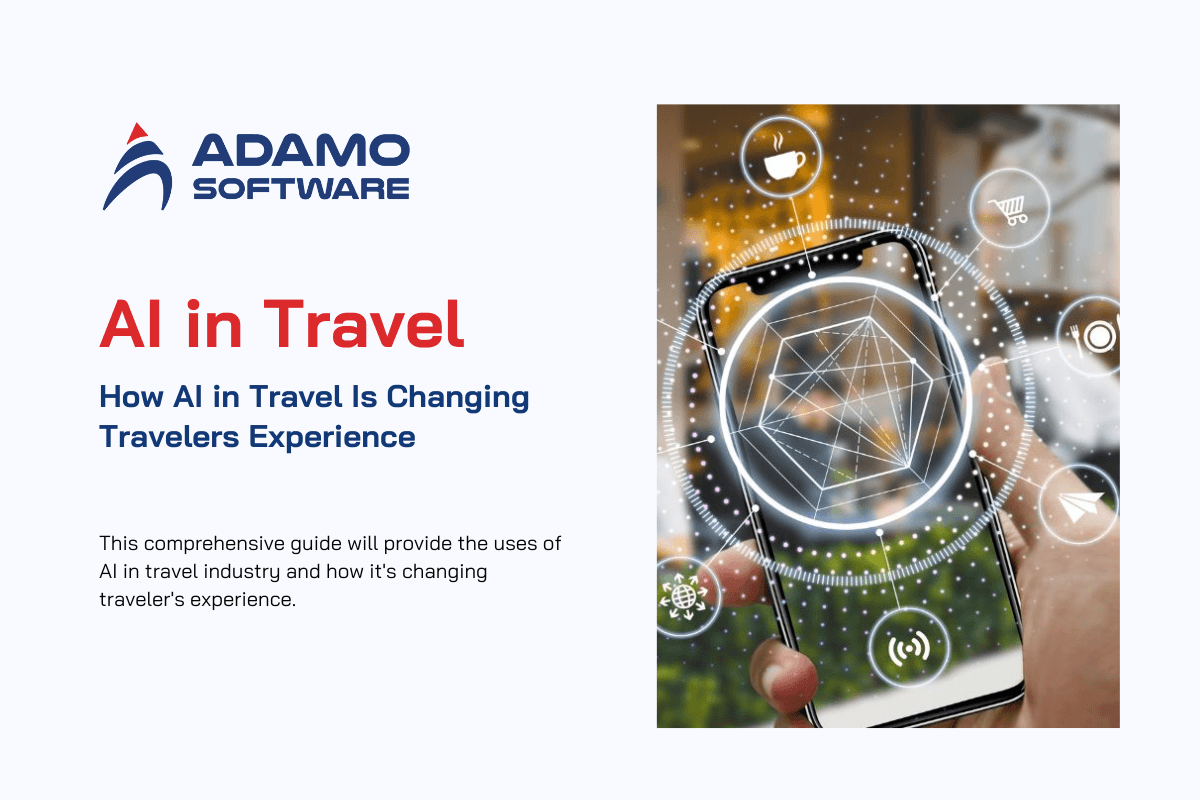
In the age of the digital era, Artificial Intelligence (AI) is developing at an extraordinary speed and leaving a deep mark in every field, including finance, health care, education, transportation, and the travel industry is no exception. According to Statista’s Report on AI market size, the global AI market is predicted to reach approximately 1,847,495.6 million USD by 2030.
As for AI in travel industry, it is gradually changing the way we plan, experience, and document adventures around the world, from automated scheduling, customer service, and personalizing travel experiences to travel destination management and customer service optimization.
Although AI has many positive impacts on the travel industry, it also has many challenges. In this post, we’ll look at how AI in travel industry is changing travelers’ experiences.
I. How Will AI Impact Travel Industry
The development of AI has many impacts on many fields, from healthcare to finance, banking, agriculture, and transportation to agriculture, especially it has had a significant impact on the travel industry. Travel companies from small to industry giants are actively using these technologies to provide more efficient, safer digital experiences for their customers.
Consumers use AI tools to power their travel experiences. 39% of people say they want to get recommendations for popular travel destinations from AI, while 36% use AI to learn about local places to eat.
However, according to NRG research, despite the positive effects of AI in travel industry, some users still do not trust some aspects of AI when planning and booking travel. Due to a number of problems that occur when using AI, such as travel enthusiasts being deceived by poor quality instructions created by AI to errors in information gaps when using systems such as ChatGPT, AI still doesn’t seem like a comprehensive solution for travel planning.
NRG’s research summary concludes that customers are excited and satisfied with the benefits of AI in travel industry:
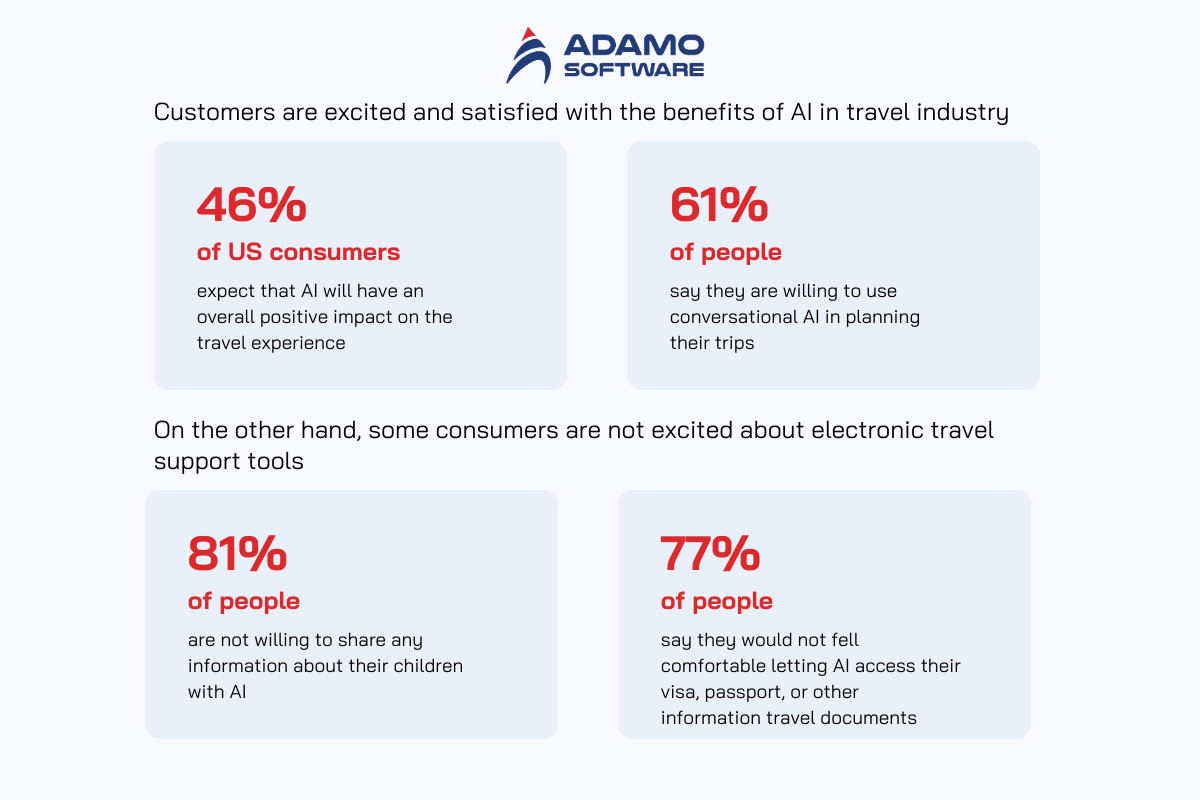
– 46% of US consumers expect that AI will have an overall positive impact on the travel experience.
– Only 18% of them think it will have a negative impact on the tourism industry.
– In addition, up to 61% of people say they are willing to use conversational AI in planning their trips.
On the other hand, some consumers are not excited about electronic travel support tools:
– 81% of people say that when they use AI help to plan a trip, they often double-check all information provided by AI before making any decisions based on that information.
– 81% of people are not willing to share any information about their children with AI.
– 77% of people say they would not feel comfortable letting AI access their visa, passport, or other important travel documents.
– Another 51% say they worry AI tools cannot secure their personal data.
Users who use conversational AI see it as a kind of virtual travel agent or concierge for them. To prepare for the trip, consumers can ask AI in travel industry to provide suggestions on places to stay, famous places to visit, and places to eat to make more optimal use of their budget.
While AI in the travel industry, like ChatGPT can make suggestions for your planning, it cannot solve problems as quickly as a concierge. Because they can help modify your itinerary in real-time. Collins says that local tour guides can better understand the tourist destination and help you settle in. At the same time, it gives you an overview of the area you are in and shares other necessary suggestions for you. They will also stay in touch with you throughout your trip and can help you make reservations and plan your next activities in real-time.
According to Calderon, AI in travel industry will make recommendations based on the most popular searches it learns from other users. However, not all travelers have the same travel goals and experiences, and even AI in travel industry doesn’t have as much travel knowledge as the people who live in the places you want to visit. She also said that AI is only as good as the clarity of what you need and the accuracy of the information that is already available on the Internet. Industry experts and local travel agents analyze, predict, and have the knowledge and contacts to recommend the right travel guide, the best hotels, and ideal experiences.
Integrating AI in travel industry revolutionizes the way travelers plan and experience their journeys, including AI in tourism and AI in hospitality industry.
II. Top Uses of AI in Travel Industry
Almost every major company in the travel industry is exploring the potential of AI in the travel industry. If you want to use AI for your business, consider AI use cases and their real value.
1. Chatbots and Online Customer Service
For hospitality businesses and other businesses in travel industry, one of the most important applications of AI is online customer support and conversation. The application has been widely adopted to support Chatbots on social media platforms and instant messaging applications. According to the latest data, the global Chatbot market size is expected to reach about 15.5 billion USD by 2028.
With this use, AI can answer questions and provide useful information to customers, even in the absence of a customer service representative. Whether customers demand faster response times on online platforms, AI can enable businesses to deliver in times that humans simply cannot.
2. Voice-Based Digital Assistance
An emerging use of AI in travel industry is to provide voice-based digital assistance. This usage allows customers to ask questions or make requests and receive an immediate response. Compared to AI Chatbot by typing time-consuming text, using voice-based digital support AI will help users get support more quickly.
Voice recognition technology provides voice control and instant access to travel information 24/7. Robots can help meet customer requests when there are no support staff present, especially during peak times.
3. Personalized Travel
The travel industry uses artificial intelligence technology to deliver more personalized travel experiences. AI can make smart recommendations on websites that offer hotel bookings, flight bookings, or other travel-related booking services.
For example, AI can use information after exploring a customer’s website and make suitable recommendations for hotels or places to visit based on what the person is looking for or considering. AI Chatbots can also be deployed to respond to customer queries while booking.
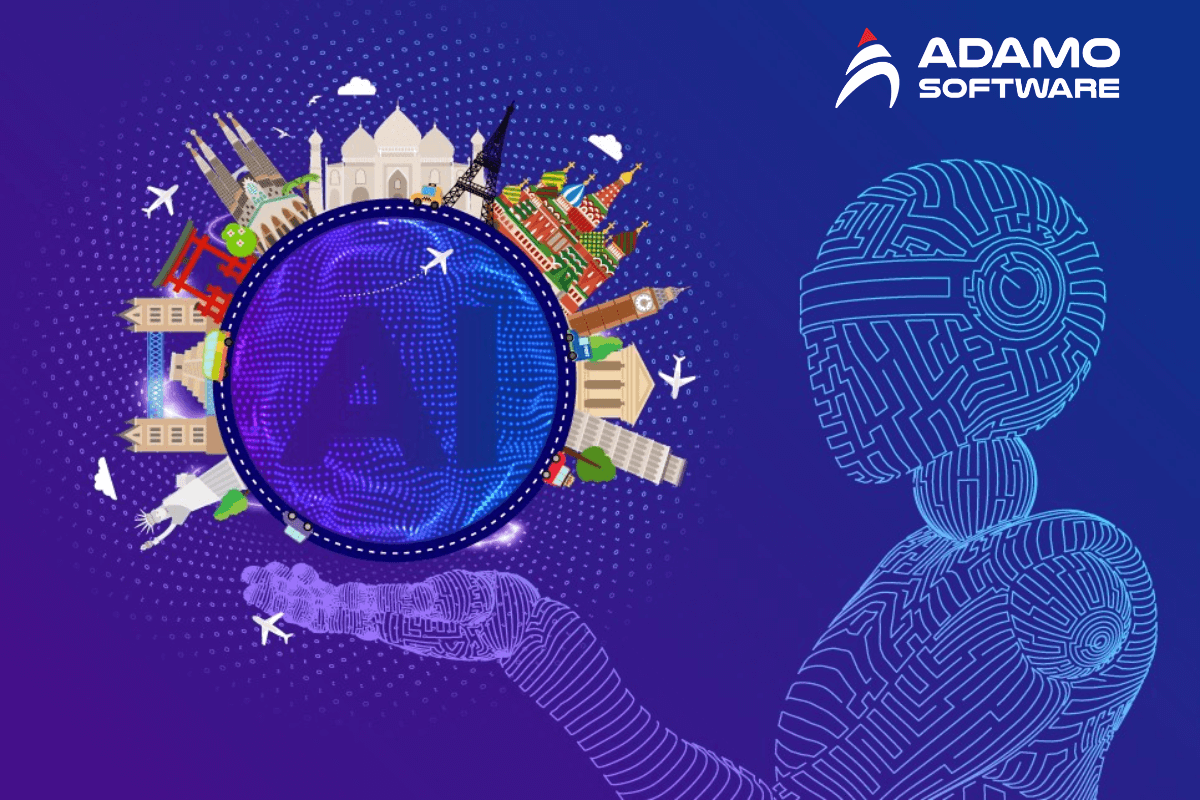
4. Data Processing and Data Analysis
One of the most popular and effective uses of AI in travel industry is to collect and analyze data to draw better conclusions about customers, travel businesses, and reasonable pricing strategies.
The outstanding advantage of AI in this use is its ability to organize huge amounts of data and information quickly and accurately. On the contrary, humans will spend a lot of time processing data and make more errors.
5. AI for travel forecasting
The cost of a trip is not cheap, so there are many good tips to save on travel costs. Countless niche websites advise users on when to buy airline tickets to get the best deals.
In addition, the use of AI in travel industry is also increasingly influencing the forecasting of flights or changing flight plans. Additionally, airlines use AI capabilities to predict maintenance times, helping to reduce the risk of mechanical problems.
Based on this usage, AI-powered software can use features such as viewing weather forecasts, past flight times, and trends related to flight speeds for accurate forecasting of exact flight arrival time and flight delay time. Therefore, customers using the software can capture more accurate and reliable information.
6. Smart Baggage Handling
The use of artificial intelligence in tourism also applies to baggage handling and security. AI is used to classify luggage more effectively and reduce errors that can lead to lost luggage. In particular, AI can help classify unclaimed and lost luggage.
AI technology can also be deployed for security. For example, when airport security systems scan luggage, AI can automatically scan images and detect objects of possible interest. An alert system can then be set up, attracting the attention of security personnel if anything suspicious is detected.
7. Artificial Intelligence (AI) Face Recognition
Artificial intelligence technology is the basic technology capable of automatic facial recognition. This technology allows real-time comparison of images with images in the database, using facial characteristics to identify individual customers. The best facial recognition technologies are capable of identifying individuals in just a few seconds.
AI facial recognition in travel and hospitality is often deployed for information security purposes. In some cases, facial recognition can also be used to determine how many people are in a particular area, which also ensures safety and security.
8. Flexible Pricing
Many businesses in the travel industry operate with flexible pricing models based on demand and availability. This also applies to hotels, airlines, and other types of businesses.
AI also makes it easier to intelligently adjust prices and ensure set levels thanks to its ability to organize and analyze data quickly. Especially during periods of increased demand, prices can often be set higher than during times of low demand.
9. Social Media Channel Analysis Artificial intelligence
AI in travel and hospitality also plays an important role when used to analyze data on social media platforms. Travel businesses can use AI to understand customer reviews better and how users interact with their social media channels.
Social media channels attract a lot of interactions every day that can be difficult and time-consuming to check and analyze them manually. So, with the help of AI, businesses can identify the most popular trends and emotions interactions every day that it can be difficult and time-consuming to check and analyze them manually. So, with the help of AI, businesses can identify the most popular trends and emotions so they can better understand their target audience.
10. Face-to-Face Customer Service
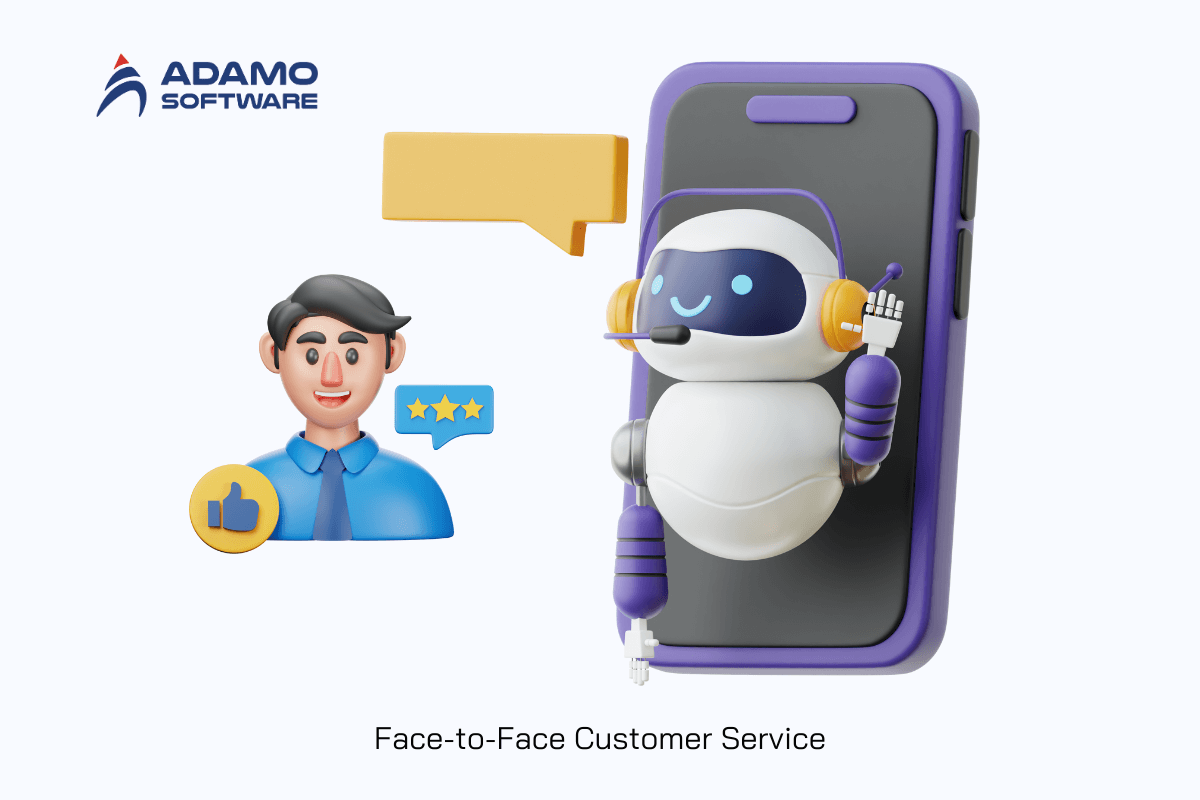
Besides the popularity of using AI to support online customer service, one of the emerging trends today is using this artificial intelligence technology for face-to-face customer services. This is highly effective in cutting down queues at the information desk or reception desk to improve overall efficiency.
An example of this usage is the AI robot ‘Connie’ created by Hilton. This robot uses AI and voice recognition to provide travel information to customers interacting with it. The AI robot ‘Connie’ will also learn from each human interaction to improve the quality of all future communications.
III. Challenges When Implementing AI in Travel Industry
While implementing AI into travel products and services has many significant benefits, it will also be labor-intensive and require overcoming some significant obstacles. In this section, we’ll look at some of the key challenges travel companies may face when integrating AI into existing projects:
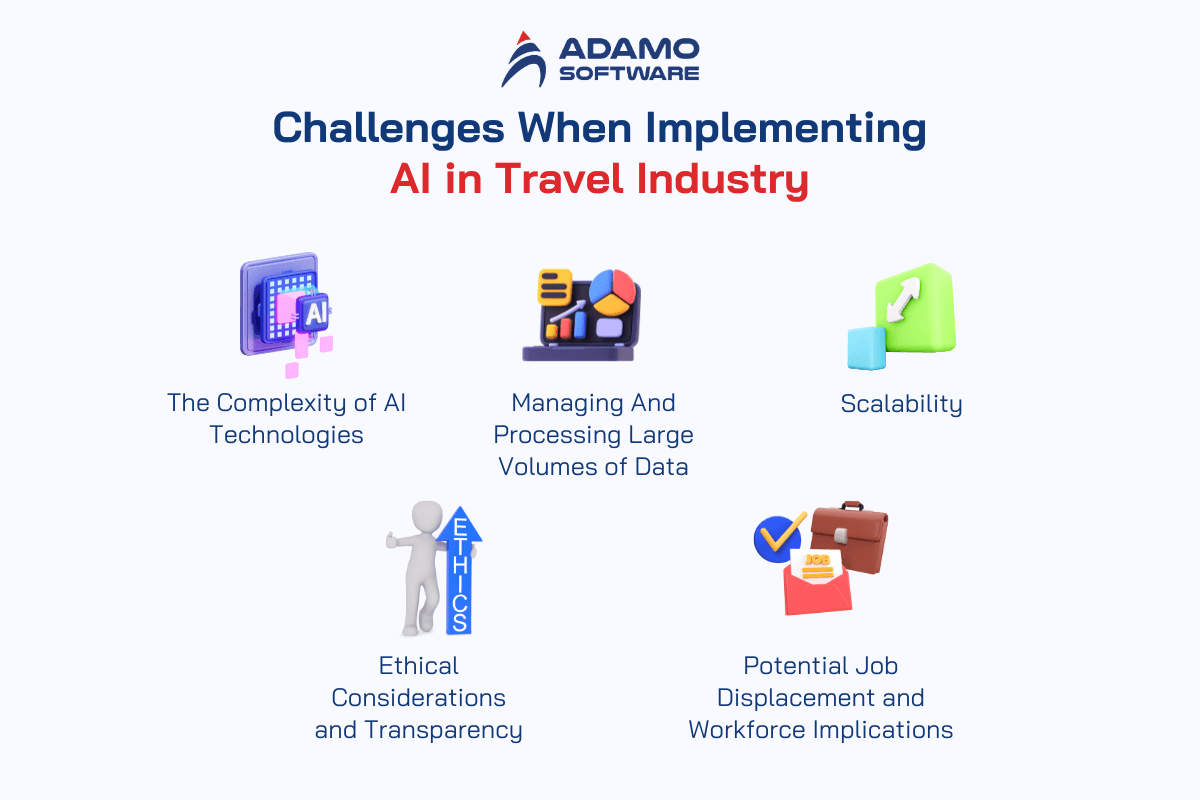
1. The Complexity of AI Technologies
AI technology is so complex that it requires highly specialized knowledge and skills, so travel companies should continuously invest and develop to build diverse data sets for more tourists. For example, partnering with various travel product and service providers or actively collecting data from users with diverse needs and preferences.
In addition, to overcome this challenge, businesses should also promote cultural innovation, invest in employee training, or perhaps collaborate with external experts to implement successful AI initiatives.
2. Managing And Processing Large Volumes of Data
To manage data needed for AI algorithms, it is imperative to have robust data management practices in place, including data storage, cleaning, and validation processes. This ensures that AI models are based on high-quality data, delivering more accurate and reliable results.
Travel companies often have a lot of data from many different sources such as booking systems, customer relationship management (CRM), and data on social media platforms. That’s why integrating all this data into a single centralized platform and tying them together is crucial for AI to work effectively.
In particular, to solve this problem, data records or a central repository can be deployed to store all travel data in raw format. This also allows for flexible data search and analysis, facilitating the creation of diverse data sources for AI training.
3. Scalability
AI designing may need scalable and flexible capabilities, at the same time also the use of cloud services and a modular approach for easy extensibility to overcome this challenge.
Cloud platforms offer cost-effective scalability and access to advanced data analytics tools, making them ideal for managing huge data sets.
4. Ethical Considerations and Transparency
When investing in AI, travel companies should be transparent about how they use AI in their applications, including data collection and processing methods. In addition, businesses should also consider the ethical implications of the AI features they use, such as potential biases and privacy and security concerns.
5. Potential Job Displacement and Workforce Implications
According to the latest report, the development of AI and automation is expected to replace 75 million jobs globally by 2025, but it also creates an additional 133 million new jobs. For the travel industry, AI has the potential to replace repetitive tasks such as data entry, managing reservations, and customer service, leading to a lump of labor.
IV. 5 Examples of Artificial Intelligence in Travel
AI in travel industry has many uses. For example, AI Chatbots and digital assistants; create personalized travel recommendations; analyze and evaluate customer data and social media posts; Flight forecasting and other applications.
Therefore, businesses in the tourism industry can identify inefficiencies and learn from customer data to adjust their work processes and tourism products. Ultimately delivering a better and more seamless travel experience for customers.
Here are examples of artificial intelligence in travel and how it uses AI in travel industry:
1. Hotel Engine
Hotel businesses use Hotel Engine’s functions to manage hotel searches and reservations for business trips effectively. Companies can also use this solution to include incentives and loyalty programs for future trips. Ensure businesses do not incur additional costs if they have to adjust, change, or cancel travel plans.
Hotel Engine is powered by AI from CorralData to streamline data integration so users can access valuable information to help make better decisions.
2. Smartly
Smartly provides an AI-based advertising platform to support advertising campaigns for brands across many industries, and travel is no exception. Its solutions range from digital advertising platforms to automated campaign management. Travel companies using Smartly’s technology have seen its benefits in multiplying conversion rates and reducing manual work for more creative production. This highlights the role of AI in the travel industry in optimizing marketing efforts.
3. IDeaS
IDeaS builds software and systems to streamline revenue management for hospitality and tourism businesses. Its solutions are integrated with AI, supporting automation that reduces manual tasks to improve work efficiency and gain insights to make profitable decisions. Ideas’ technology is reported to have supported thousands of hotels and resorts in more than 150 countries. This exemplifies the impact of AI in the travel industry on revenue management.
4. Navan
This is part of Navan’s all-in-one travel technology platform that helps personalize travel bookings. Thanks to its multi-tasking and aggregation AI capabilities, Ava can learn about traveler needs and preferences to streamline the booking process. Ava is integrated directly into the website or application so it enhances and goes beyond other traditional tools by automating search fields in Navan. This demonstrates how AI in the travel industry can enhance the booking experience.
5. Sojern
Sojern’s technology solutions that can be applied across the travel industry include AI Intelligent Concierge Services to engage travelers and improve their experience. It is equipped with more than 1,000 answers to guest questions, giving virtual agents the ability to handle tasks such as sending items to hotel rooms upon customer requests or scheduling appointments for Spa services. This showcases the use of AI in the travel industry to enhance customer service and engagement.
The integration of AI in the travel industry revolutionizes how businesses interact with customers and manage operations, resulting in improved efficiency and customer satisfaction.
V. How Adamo Help You Utilize the Advantages of AI in Travel Industry
To recapitulate, building AI in travel industry brings many benefits to businesses and augmenting customers’ experience.

As a leading technology partner, Adamo Software excels in empowering businesses to develops offers advanced AI development services. With a team of skilled professionals and a wealth of experience in travel and hospitality software development, Adamo can give your business cutting-edge integrate AI into software solutions, helping you stay ahead of your competitors.
In addition, by collaborating closely with customers and providing deep insights from data, we will help your business utilize the advantage of AI in the travel industry for transformative growth.
If you’re thinking about using AI in your travel business, contact us now for more information and support.
FAQs
1. Which providers enable voice search integration with machine learning for travel bookings?
Here are several providers that enable voice-search integration + machine learning for travel bookings.
| Provider | What they offer in voice + ML for travel bookings | Key features & how ML is applied |
|---|---|---|
| Neural Voice | A voice AI platform tailored for travel agencies — handles bookings, changes, cancellations via voice. | • Natural‐language understanding (NLU) + intent recognition for queries like “change my Paris flight”. • Real-time interaction with booking systems (GDS/API) • Multilingual voice recognition and persistent preferences |
| Dasha AI | AI system built for voice-based booking of travel appointments (flights/hotels) via conversational voice. | • Speech-to-text + NLU + dialogue manager • Learns from voice interactions to improve understanding • Used to automate voice booking conversations in travel context |
| Skyscanner | Travel search engine moving into voice & conversational search; uses ML to power “voice search” for travel. | • Voice search of flights/hotels using natural language (“Find me a flight to Sydney this July under $800”) • ML models to personalise results based on preferences/travel history • Integrates voice into search rather than full booking flow (in many cases) |
| CallPage / its “AI Voice Agent” | Voice bot solution used by travel agencies/websites to convert voice leads/bookings via voice agent + ML. | • Voice-based lead capture & booking qualification • ML-based intent detection and routing • Integration with travel websites to convert via voice |
| Softcery (as research/guide) | While not a booking provider per se, their research outlines how AI voice agents with ML are built for travel bookings. | • ML for intent classification, entity extraction (destination/date), memory of past preferences • Architecture for voice agent in travel with GDS/booking APIs |
2. How is AI influencing the travel industry?
AI automates bookings, anticipates costs, and personalizes experiences, making travel planning more intelligent and efficient.
3. What are the most typical AI application cases in travel?
The most popular use cases are AI chatbots, predictive analytics, smart baggage management, and dynamic pricing.




